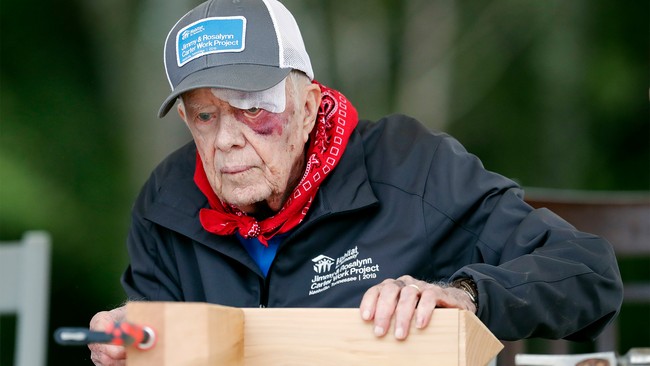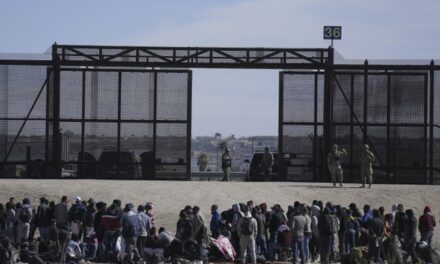We support our Publishers and Content Creators. You can view this story on their website by CLICKING HERE.
Jimmy Carter, the 39th and longest-living president, died Sunday amid family in his ranch-style home in Plains, Ga. Born Oct. 1, 1924, he was 100.
The cause of death was not revealed. But the former president has experienced episodes of cancers, melanoma. His father, mother, and all three siblings died of pancreatic cancer.
Advertisement
Carter had been hospitalized several times in recent years. On Feb. 18, 2023, his foundation, the Carter Center, announced he had stopped additional medical intervention and was going home “to spend his remaining time at home with his family and receive hospice care.”
Such openness on health was characteristic of Carter but could not have happened as recently as the days of his presidency. The advance of medical technology required a whole new level of decision-making by patients, families, and doctors. Now, instead of merely accepting the end of life, they could actually postpone and, at times, defeat death. Technology can breathe for a patient, cleanse their blood, and even pump a chemical slurry into them as nutrition.
Clearly, Carter had decided further treatments would be prolonging dying, not living.
BREAKING: Jimmy Carter, 39th President of the United States, Has Passed Away
Carter’s political career was meteoric: Four years in the state Senate, four years as governor, four years as president. The results were mixed. He had some significant diplomatic achievements marred by the long Iranian hostage crisis, severe domestic economic problems, and an often-reclusive style that came across as a superiority complex that alienated the inbred cliques of Washington, denying him crucial support from within his own Democratic Party.
As one result, Carter became the first of three modern-era presidents to lose reelection bids, all of them over economic and internal party challenges.
What the devout Baptist did, however, was live a rich, full political afterlife of social service, the longest and likely most productive in American history, primarily through Habitat for Humanity based in Atlanta. The nonprofit, which builds and refurbishes homes for the poor in the U.S. and abroad, reported that Carter and Rosalynn, his wife of 77 years, worked on 4,000 such projects on several continents over the years.
Advertisement
For some 40 years until recently, Carter taught Sunday School every week at his local Maranatha Baptist Church, even during his exhausting cancer therapies and recoveries from frequent falls.
Except for one bout of school hooky, James Earl Carter Jr. was almost always doing something. His father, who farmed and ran a general store, gave young Jimmy an acre of land to work. The boy was so successful, he turned it into a modest and profitable farm.
Carter began college during World War II. He set his sights on the U.S. Naval Academy but attended Georgia Tech for a year to bolster his math skills. Only three presidents have graduated from the service academies – Carter from Annapolis in the top 10 percent of his class and Ulysses S. Grant and Dwight Eisenhower from West Point. The Carters married in July 1946 after graduation. They have four children.
Ensign Carter served on battleships and the submarine USS Pomfret, which captured his imagination.
In the early 1950s, he was assigned to the team developing the nuclear submarine fleet and became a favorite of Admiral Herman Rickover, the fleet’s founder. He put Carter on the future crew of the second nuclear sub, the Seawolf.
In July of 1953, however, Carter’s father died of cancer, and duty called the eldest son home to the family’s peanut farm business, which he ran successfully. He also became a Democrat activist and supporter of the building civil rights movement.
In 1963, Carter tried to win a four-year state Senate seat. He succeeded. He then aimed for the Georgia governor’s chair and took office in 1971. Almost immediately, Carter and close aide Hamilton Jordan began plotting a presidential run. They studied George McGovern’s disastrous 1972 White House run in which Richard Nixon took 49 states, including McGovern’s South Dakota.
Advertisement
Everything was stacked against the hardly-known governor. Carter decided that after Vietnam, violent war protests, and assassinations, Americans might like a fresh non-Washington face, an outsider. (Does this sound reminiscent of 2016?) The ensuing Watergate scandal played right into his strategy.
The Iowa caucuses were first up in 1976. My news colleagues back then said wherever they went across the state that winter this Jimmy Carter guy had already been there. Locals were talking about this nice Southern gentleman who’d been in the Navy, knew agribusiness well, and could relax in a living room while listening.
In a Democrat field of five, that little-known Jimmy Carter won going away. And a long, enduring avalanche of “OMG, Who’s This New Guy?” media coverage erupted. Then, Carter won the New Hampshire primary. While other Democrat candidates chose to compete in some primaries, Carter entered 30 of 31.
Part of Carter’s platform involved reining in the CIA and cutting defense spending. Liberals liked that. Conservatives generally prefer governors (Bill Clinton would use that 16 years later) because they’re not of D.C., and they liked Carter’s demand to cut government waste.
Incumbent Gerald Ford damaged himself by pardoning Nixon, then picked another Washington insider, Bob Dole, as his VP. In an October debate, President Ford inexplicably asserted, “There is no Soviet domination of Eastern Europe, and there never will be under a Ford administration.” This was news to Eastern Europe which by then had been under Soviet domination for 31 years.
Advertisement
On Nov. 2, the Jimmy Carter-Walter Mondale ticket got 40.8 million popular and 297 Electoral Votes to Ford’s 39.1 million and 240. As one of his first official acts, Carter pardoned all Vietnam War draft dodgers. His not-so-Secret Service codename was Deacon.
As you might expect from a nuclear engineer, Carter was into studying issues and documents with none of the hail-fellow, hypocritical chitchat that’s usual in Swamp politics. He and Rosalynn did not join the petty D.C. social scene, making them appear aloof and isolated.
Carter’s presidency was marked by troubled economic times, inflation, plus slow growth. His plans for reforms in taxes, health care, and welfare withered from poor Democrat support in Congress. He did finally succeed in ceding control of the Panama Canal to that country with U.S. safeguards — a matter that has seen renewed interest of late.
‘Complete Rip-Off’ Will Stop: Trump Floats Making Panama Canal America’s Again
Trump Trolls Canada, Denmark, and Panama for Christmas but Behind the Fun He Makes Serious Points
After 12 days of secret negotiations in 1978, Carter engineered the Camp David Accords between Israel’s Menachem Begin and Egypt’s Anwar Sadat. Three years later, Sadat was assassinated for that when Muslim fundamentalists broke from parade units to machine-gun the reviewing stand.
After the 1979 Soviet invasion of Afghanistan, Carter banned U.S. participation in the Moscow Olympics.
Perhaps the worst political blow for Carter came in 1979 when revolutionaries in Iran kidnapped 52 Americans and held them hostage for 444 days. A disastrous U.S. military rescue mission failed with eight deaths, making Carter appear even less effective. The failed mission eventually led to the creation of elite commando units such as Special Forces.
Advertisement
Again in 1980, Americans seemed to seek another non-Washington face, a familiar movie star, TV spokesman, and former California governor with a sense of humor, Ronald Reagan. Even with a third-party independent candidate, John Anderson, the Reagan ticket with VP George H.W. Bush captured 43.1 million popular and 489 Electoral votes, the highest ever for a non-incumbent president. Carter-Mondale got 35.5 million and 49 electoral votes.
Reagan campaigned on rebuilding the military, supply-side economics, and balancing the budget. Carter attacked him as a dangerous right-wing extremist and with a Democrat tactic still in use today, alleging Reagan’s desire to cut Social Security and Medicare. Reagan’s replies typically began with, “There you go again.”
But Carter was saddled with a divisive primary challenge from an ambitious Sen. Ted Kennedy, inflation of 14 percent, long gas lines, an ineffectual image, and the hostages in Iran. Iran’s first revolutionary leader, Ayatollah Khomeini, played some American politics too, releasing all the hostages at the precise moment of Reagan’s inauguration.
Carter’s 1980 loss was the first presidential reelection defeat since Herbert Hoover’s in 1932. Since then, there have been two more — George H.W. Bush in 1992 and Donald Trump in 2020.
In 1984, Carter’s VP, Walter Mondale, lost to Reagan by an even larger margin. Years later, Mondale told me he knew he was doomed to defeat during the second debate when the 73-year-old Reagan, then the oldest president in history, quipped to the 56-year-old Mondale, “I am not going to exploit, for political purposes, my opponent’s youth and inexperience.”
Advertisement
In his long post-presidency, Carter dabbled in diplomacy, negotiated prisoner releases, and occasionally offered unsolicited advice, opposing Obama’s drone strikes on terrorists and, in 2016, saying he should recognize a Palestinian state before leaving office. He called George W. Bush’s administration “the worst in history.”
In 2002, Carter became the second U.S. president after Theodore Roosevelt to be awarded the Nobel Peace Prize for “undertaking peace negotiations, campaigning for human rights, and working for social welfare.”

In healthy times Carter wrote two books on Palestine and enjoyed bicycling, painting, and had a lifelong addiction to woodworking. He said he prayed several times a day and tried to live his life according to a sermon he heard as a youth, “If you were arrested for being a Christian, would there be enough evidence to convict you?”
Carter was plagued by a variety of health issues in recent years. In 2015, he announced that a melanoma skin cancer had metastasized into his brain and liver. He underwent treatments, including radiation, and said later he was cancer-free.
Five years ago this May, he fell at home and broke his hip, requiring surgery. Months later, he fell again, hitting his head and requiring numerous stitches. That did not keep him from carpentering in another Habitat home-building project soon after.
Some years ago, Jimmy Carter was asked a question familiar to many elderly. His answer:
“I’d like to be remembered as someone who was a champion of Peace and human rights.”
Advertisement

 Conservative
Conservative  Search
Search Trending
Trending Current News
Current News 





